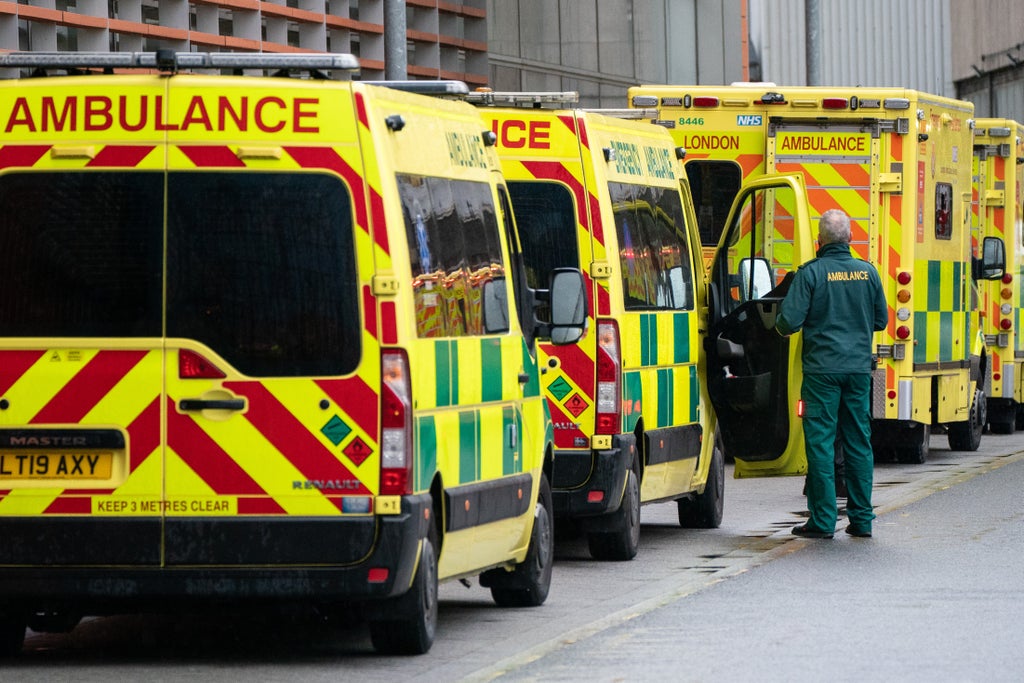
NHS trusts have been told that they must act immediately to improve ambulance response times after leaked data showed some stroke patients were waiting for four hours, while thousands more A&E patients have experienced “dangerous” wait times in emergency departments.
Data seen by The Independent showed that some patients with potentially life-threatening conditions had waited for more than four hours for an ambulance against a target time of 18 minutes.
Ambulance services across the country have reported being under extreme pressure, with West Midlands Ambulance Service warning that at least 72 patients are likely to have died in the last year as a result of delays in response times.
NHS figures also showed emergency departments suffering, with the past six weeks seeing an average of 1,173 patients each day waiting more than 12 hours in A&E from time of arrival to being given a bed. This is the equivalent of around 6 per cent of A&E attendances.
Figures published by NHS England on Thursday revealed that 20 A&E departments had been forced to divert ambulances in the past week, while data showed that more than 9,000 ambulances were delayed by more than an hour outside A&E.
The incoming president of the Royal College of Emergency Medicine, Dr Adrian Boyle, said that 12-hour waits in A&E from arrival were “dangerous” for patients, and warned that healthcare leaders needed to create more hospital capacity to address this problem as well as the issue of ambulance delays.
Several NHS trust chiefs have said that meetings over the past week have seen a “big push” on ambulance handover delays, and NHS England have told trusts that there needs to be an “immediate” resolution to the problem as ambulance response times have increased “exponentially”.
The leader of one trust spoke about the need for “cohorting” outside A&E departments – the practice of grouping patients in order to allow some paramedics to leave.
One ambulance service director told The Independent of several hundred lost hours due to delays outside A&E. They said: “If you have a look at the rate of deterioration, things have got twice as bad in the last six months. Lost hours have almost doubled and the rate of decline is now exponential. So if we’re not careful, we won’t get through the summer, let alone next winter. As long as the handover delays get worse, we won’t get to patients in time and patients will almost certainly die.”
According to internal data for the Midlands area, some “category two” patients – those suspected to be suffering from strokes or heart attacks – waited for more than four hours this week, while average response times ranged from around one and a half hours to almost two hours, against a target of 40 minutes.
For the most seriously ill patients, known as “category one”, who have immediately life-threatening conditions, the average waiting time for an ambulance reached 18 minutes last week, whereas the target is 7 minutes.
Dr Boyle said: “If you look at all the performance indicators, we’ve got everything going the wrong way, and it doesn’t feel like we’re recovering at all from a very tough winter.
“The pressure that we’re seeing in most frontline services over the last couple of years has been a year-round problem. It’s tough all the time. The fundamental problem is not because of respiratory disease, although that can make bad situations worse. It’s actually lack of capacity within our hospitals, and lack of flows through our hospitals, which means that people get backed up and stuck in emergency departments.”
Dr Boyle added: “Long waits in emergency departments are not just frustrating and tedious, they’re actually dangerous”.
He also warned against the practice of “ambulance cohorting”, calling it the “worst possible solution”.
“We absolutely recognise the importance of reducing ambulance handover delays, we recognise that people are dying because ambulances aren’t getting to them in time, and that’s the catch-22. But the idea of just warehousing people outside is the wrong solution for an important problem.”
He said that NHS leaders needed to focus on creating more capacity within hospitals, and addressing the causes of delayed discharging of patients, including staff sickness and a lack of social care availability.
Meanwhile, staff absences due to Covid hit a 10-week high last week, the latest NHS England data showed, with an average of 28,500 staff off work for reasons relating to the virus.







